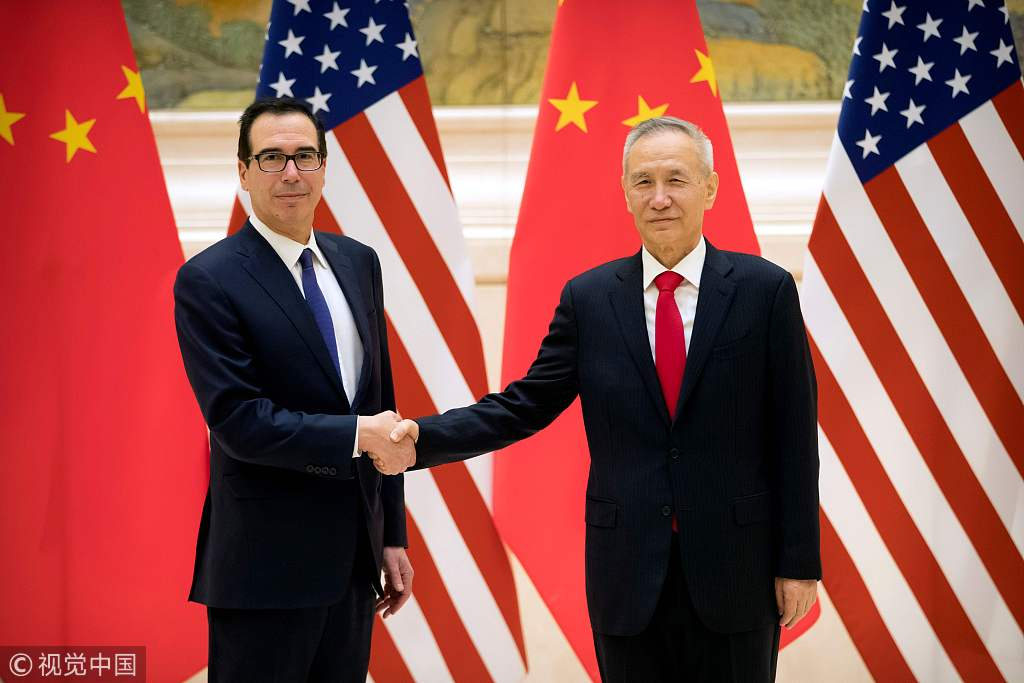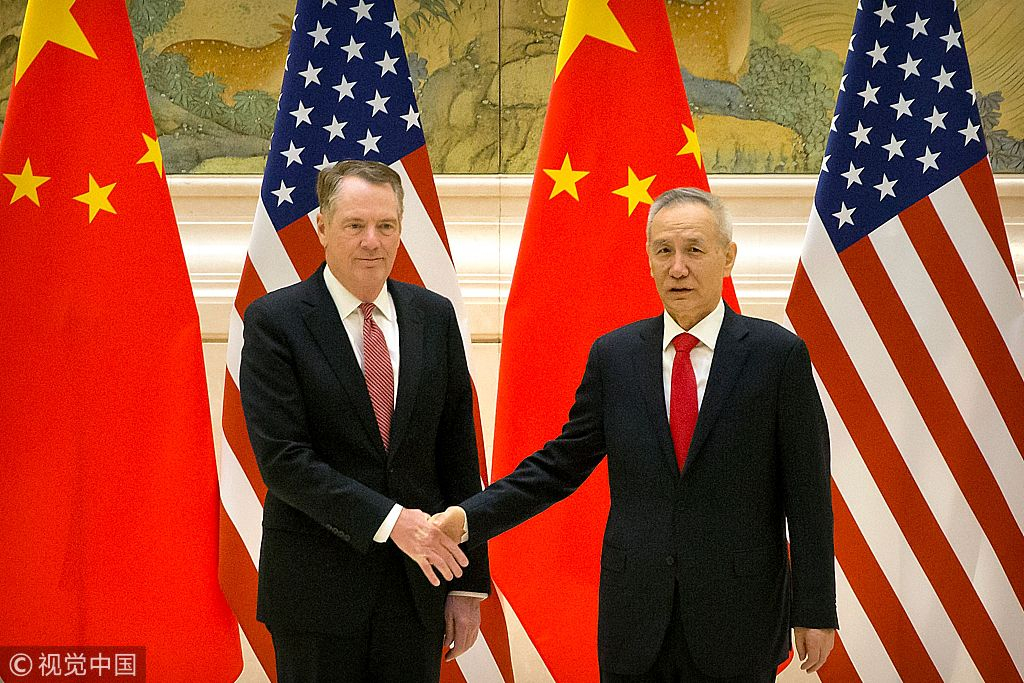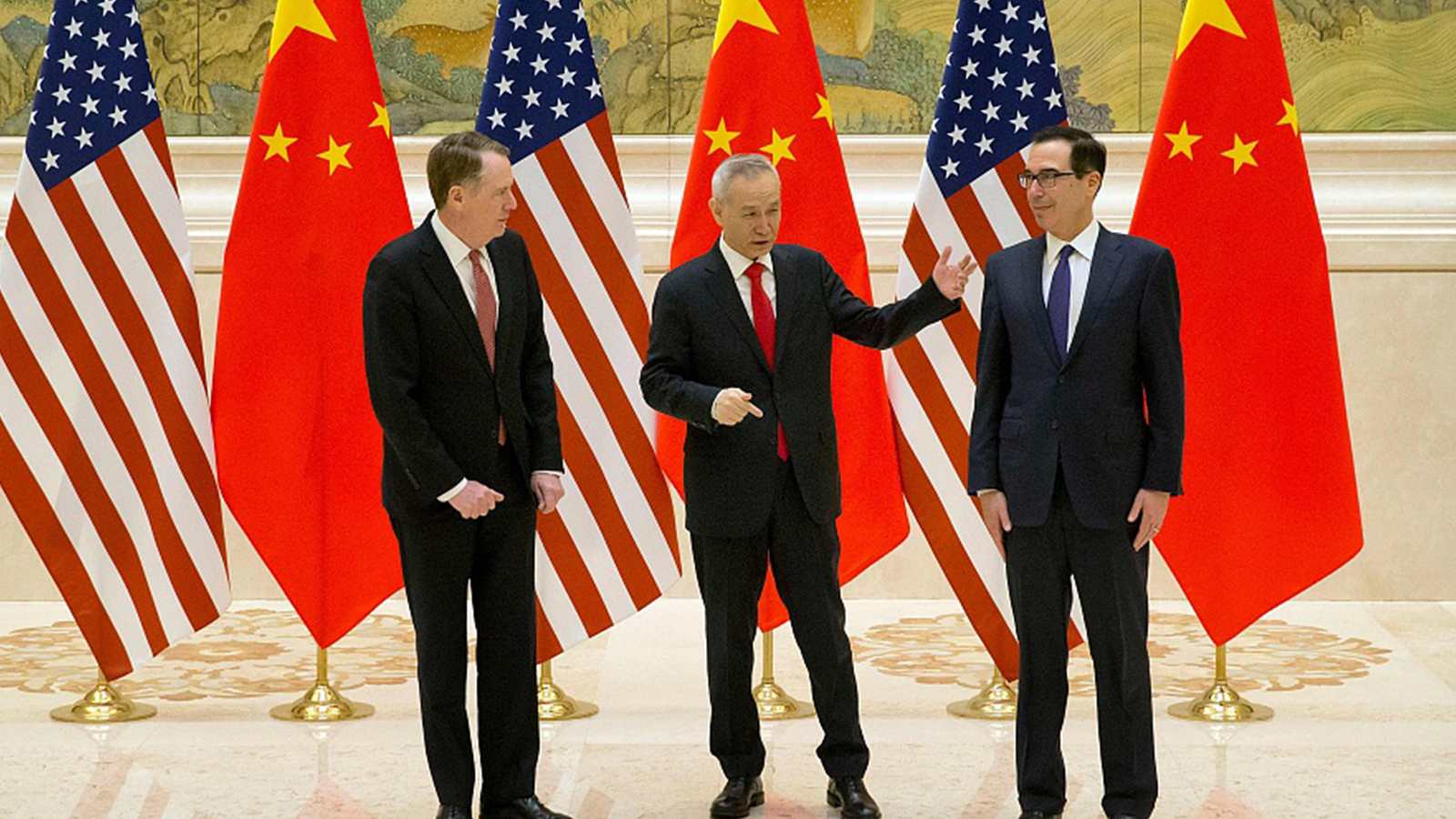This week, Chinese Vice Premier Liu He is back in Washington DC for another round of trade talks with U.S. officials following the latest one that was concluded in Beijing last week. As the two countries have ramped up efforts to reach a deal before the March 1 deadline set by U.S. President Donald Trump, discussions have emerged on who may come out of the trade talks as the winner?
CNBC put out a commentary claiming that China will ultimately win because the country would not give much ground on the issue of structural reforms, a key demand from the U.S. side, but some Chinese scholars think otherwise.

U.S. Treasury Secretary Steven Mnuchin (L) and Chinese Vice Premier and Lead Trade Negotiator Liu He shake hands as they pose for a photo before the opening session of trade negotiations at the Diaoyutai State Guesthouse in Beijing, February 14, 2019. /VCG Photo
U.S. Treasury Secretary Steven Mnuchin (L) and Chinese Vice Premier and Lead Trade Negotiator Liu He shake hands as they pose for a photo before the opening session of trade negotiations at the Diaoyutai State Guesthouse in Beijing, February 14, 2019. /VCG Photo
Both Cheng Dawei, a professor at the School of Economics of China's Renmin University, and Wang Yong, professor of international political economy at Peking University, believe that claiming China as the only winner of the trade war is one-sided. Cheng pointed out that the conclusion of a deal between any two parties suggests a result of mutual agreement.
Since neither China nor the U.S. has the appetite for signing a deal that is ultimately going to hurt their own interests, a deal, if reached, will be a win-win situation. In this sense, Cheng said that "both China and the U.S. will be winners."
The sticking point of the U.S.-China trade negations centers around China making changes on structural issues, most notably intellectual property rights protection and alleged enforced technology transfer.
While the claim that China will eventually win the trade war stems from the assessment of the current situation, which suggests that China is not going to satisfy the U.S. demand on the issue exactly the way the U.S. demands, Cheng noted that it does not equal saying that the U.S. is going to be the loser of the trade negotiations.
Cheng explained that there are both short-term and long-term gains involved for both parties. While addressing structural issues requires more time than a few months' discussions, Cheng said that if trade talks yield any concrete results, the U.S. does also at least reap plenty of short-term benefits, referring to the large purchases China is going to make from the U.S. to defuse tensions around the trade imbalance issue.
For example, as Reuters reported, China has offered to increase imports of "U.S. soybeans and other farm and energy commodities" to reduce the U.S. trade deficit. These short-term gains also carry much weight in Trump's calculations, said Cheng.

U.S. Trade Representative Robert Lighthizer (L) and Chinese Vice Premier and Lead Trade Negotiator Liu He shake hands as they pose for a photo before the opening session of trade negotiations at the Diaoyutai State Guesthouse in Beijing, February 14, 2019. /VCG Photo
U.S. Trade Representative Robert Lighthizer (L) and Chinese Vice Premier and Lead Trade Negotiator Liu He shake hands as they pose for a photo before the opening session of trade negotiations at the Diaoyutai State Guesthouse in Beijing, February 14, 2019. /VCG Photo
On long-term structural issues, Chinese scholars including Wang pointed out that China is making progress as well, as certain changes on this front are mostly in China's interests. However, he also added caveats that the country will do so within the framework of the multilateral trading system and in a way that is consistent with China's needs and interests. For this reason, he said that the U.S. should not expect China to bow to the U.S. pressure and accept all its terms.
Nevertheless, that does not mean that the U.S. will bear losses or that the U.S.' enthusiasm to come to an agreement with China would be dampened, said Wang.
U.S. is also keen on a deal
He noted that while China's position has always been consistent and clear that it would welcome a deal, Trump is also eager to make progress.
He argued that first of all, with a deal in place, Trump could claim yet another "victory" to his domestic supporters. Second, as the president is deeply embroiled in domestic hot water, an agreement with China would also, for the time being, help to alleviate some of the pressure mountings on him.
The crises facing the administration are indeed only growing. Over the weekend, as ex-acting FBI chief Andrew McCabe revealed in a TV interview, there have long been discussions concerning removing Trump as the president. Adding more drama to his presidency, 16 U.S. states filed a lawsuit on Monday over his emergency declaration last week to fund a wall on the border between the U.S. and Mexico.

U.S. Trade Representative Robert Lighthizer (C) and U.S. Treasury Secretary Steven Mnuchin (2nd L) sit before the opening session of trade negotiations with Chinese trade representatives at the Diaoyutai State Guesthouse in Beijing, February 14, 2019. /VCG Photo
U.S. Trade Representative Robert Lighthizer (C) and U.S. Treasury Secretary Steven Mnuchin (2nd L) sit before the opening session of trade negotiations with Chinese trade representatives at the Diaoyutai State Guesthouse in Beijing, February 14, 2019. /VCG Photo
All these may only increase the president's desire for a deal. As the next presidential election is still two years' away, Wang said that Trump allows some degree of flexibility in dealing with China compared to the time leading up to the election.
Therefore, "from Trump's point of view, now might the best time to conclude a deal with China," said Wang, and not ruling out the possibility of the truce deadline extended, he added that the deal is most likely to be reached during March and April.
However, on the other hand, it is also important not to lose sight of certain U.S. domestic factors that do seek to thwart negotiating efforts between the two sides, especially the continuous offensives launched by the Democrats against Trump on the issue.
With that, the president recently announced that he decided to bring Democrats into trade negotiations as well. Will that complicates the picture? Wang believes that was instead a smart move by Trump. With certain compromises China already agrees to make, he said that forsaking a potential deal at this juncture only serve to harm the U.S. interest, especially its business community.
In the final analysis, even though a trade agreement between the two countries does not lead to a win-or-lose situation, it would have still been better if the U.S. had never launched the trade war in the first place. After all, it is a widely held view within China that conflicts between the two biggest economies will most certainly wreak havoc on both of them while cooperation and dialogue lead to prosperity for both.
(If you want to contribute and have specific expertise, please contact us at opinions@cgtn.com.)





